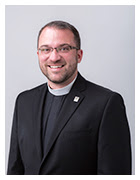Today’s blog post is from Kevin Strickland, Assistant to the Presiding Bishop and Executive for Worship for the ELCA, and is the longer form of the Worship E-news greeting for January 2017.

“Master, now you are dismissing your servant[e] in peace,
according to your word;
for my eyes have seen your salvation,
which you have prepared in the presence of all peoples,
a light for revelation to the Gentiles
and for glory to your people Israel.” (Luke 2:29-32)
In this season after Epiphany, how can Simeon’s song continue to carry us through the cadences of life’s darkness and bring hopeful light? Simeon’s “song”, has become one of our own. Many know these words well in the Latin, Nunc Dimittis, which means, “now send away,” the hymn that is sometimes sung after Communion or interestingly it is also what we sing as part of the service of Compline—the “going to bed” liturgy.
As we close our day, we sing, “Lord, now you let your servant go in peace; your word has been fulfilled. My own eyes have seen the salvation which you have prepared in the sight of every people: a light to reveal you to the nations and the glory of your people Israel.”
What have our eyes seen before going to bed? It’s usually the common ordinary stuff of life: dirty dishes, endless e-mails, which kid forgot to do their science experiment and waits until bedtime to tell you, paper work, bills, dirty clothes that seem to never end, aging parents that require more attention, etc, etc, etc.
What have our eyes seen before going to bed?
Is it the news that once again someone has been shot, or another terror attack, or another political slam made from one side of the aisle to the other.
What have our eyes seen before going to bed?
Is it the test results that reveal cancer, or the loved one who has to go into assistance because her memory is no more, or have our eyes looked into the eyes of another for the last time, as in peace and joy they now depart?
Is God’s salvation to be seen in such common, ordinary, even mundane things of life? As well, is God’s salvation to be seen in all of life’s good and bad, joy and sadness, celebration and mourning?
What have eyes seen when we gather as the assembly of God in worship? There are people who are vast and different. People who bring with them into this space a host of issues and yet in our brokenness as a body we are made whole by Christ own. Is God’s salvation to be seen in our gathering?
What have eyes seen in sacrament of Holy Communion? It is around simple things that we gather: bread and wine with one another. Is God’s salvation to be seen in this?
What have eyes seen in the sacrament of Holy Baptism? It is around simple things like water that we gather with one another? Is God’s salvation to be seen in this?
God is indeed present in an infant, in bread and wine, in water, in each other, in our gathering, in the ordinary and extra-ordinary events of every day life. Where God is present, there salvation is for those with the faith to see more than just the obvious or what is transparent.
Could it be that Simeon sings the starting notes of the canticle of all of our lives? Could it be that Simeon reminds us that we behold God’s salvation each and every time we behold the face of another that God created and each and every time we gather to watch over as another saint of God’s departs in peace?
Let us continue to sing with Simeon. Let us continue seeing the salvation of God that is before our very eyes each and every day with each and every person, until at our last we sing and we rejoice with Simeon and all the saints: “Lord, now you let your servant go in peace; your word has been fulfilled. My own eyes have seen the salvation which you have prepared in the sight of every people: a light to reveal you to the nations and the glory of your people Israel.”
May it be so! Amen.
